| Srl | Item |
| 1 |
ID:
052288
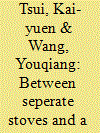

|
|
|
|
|
| Publication |
Mar 2004.
|
| Summary/Abstract |
A recent body of literature with the paradigm of market preserving federalism at its core contends that China is a de facto federalist state. With the autonomy and tax rights of local governments entrenched in the reform era, local governments have allegedly become decentralized engines of growth. Scrutinizing the underlying premises of the above paradigm, this article arrives at a picture of China's local governments as less autonomous and the system of vertical bureaucratic control as more potent than that painted by the above paradigm. Emerging from our findings is an alternative interpretation of China's central-local fiscal relations that may help us understand such recent phenomena as the proliferation of arbitrary charges.
|
|
|
|
|
|
|
|
|
|
|
|
|
|
|
|
| 2 |
ID:
052287
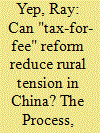

|
|
|
|
|
| Publication |
Mar 2004.
|
| Summary/Abstract |
This article questions the effectiveness and viability of the fiscal response to rural stability adopted by the Chinese state. Tax-for-fee reform (feigaishui) has been heralded as a possible solution to the cancer of excessive fiscal predation by local government. While the experiment may have achieved in relief of peasant burden, the success is simply based on central government financial sponsorship and is thus hardly sustainable as a national programme. And unless there is fundamental reform of fiscal redistribution, the new scheme will ironically hurt rather than help the poorest peasants. Putting all the blame on local cadres is politically expedient, but the central government needs to admit that the present crisis is a result of the systemic discrimination against peasants and the consequent deficit in financing rural governance. The ultimate solution entails a full-scale eradication of structural bias against the peasantry.
|
|
|
|
|
|
|
|
|
|
|
|
|
|
|
|
| 3 |
ID:
052286


|
|
|
|
|
| Publication |
Mar 2004.
|
| Summary/Abstract |
China's shift to a net oil importer has generated much speculation outside China about how China's growing dependence on foreign oil will affect its international behaviour. This discussion is framed by two competing models of China's future approach to energy security: one that foresees deeper integration into global energy markets and another that predicts efforts to minimize reliance on these markets in potentially destabilizing ways. Less attention has been paid, however, to the parallel debate unfolding inside China over how to ensure the country's oil needs are met without undermining national security. This article introduces the main participants in the debate, how the debate relates to energy security decision-making, and some of the measures to enhance energy security under consideration. It concludes with a discussion of some of the factors that will shape China's emerging approach to energy security.
|
|
|
|
|
|
|
|
|
|
|
|
|
|
|
|
| 4 |
ID:
052291
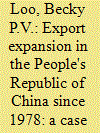

|
|
|
|
|
| Publication |
Mar 2004.
|
| Summary/Abstract |
Against the background of a complex and evolving statistical system, this article addresses three crucial issues in the understanding of the rapid export expansion of China in general and the Pearl River Delta in particular. First, the export orientation of the Pearl River Delta is critically assessed. The gradual emergence of export-oriented firms in the region and their spatial clustering around Hong Kong are highlighted. Secondly, the structural dimension of export expansion in the region is examined. Foreign-invested enterprises were found to be the "engine of growth." Lastly, an analysis of the spatial dimension of the foreign-invested enterprises' export component reveals that the juridical status and geographical locations of exporting firms are complementary in providing a better understanding of export expansion in China since 1978.
|
|
|
|
|
|
|
|
|
|
|
|
|
|
|
|
| 5 |
ID:
053134


|
|
|
| 6 |
ID:
052693


|
|
|
|
|
| Publication |
Mar 2004.
|
| Summary/Abstract |
This article explores empirically the duration of civil war. It relates the duration of civil war to two alternative models of conflict and culls testable hypotheses from the case study literature on civil war. Using a comprehensive dataset on large-scale violent civil conflicts covering the 1960-2000 period, a wide range of hypotheses are tested by means of hazard function regressions. The results show that the duration of conflict is systematically related both to structural conditions prevailing prior to conflict and to circumstances during conflict. The key structural characteristics that lengthen conflict are low per capita income, high inequality and a moderate degree of ethnic division. The key variable characteristics that shorten conflict are a decline in the prices of the primary commodities that the country exports and external military intervention on the side of the rebels. Furthermore, the results indicate that the chances of peace were much lower in the 1980s and 1990s than they had been previously. Three empirical explanations are suggested as different approaches to civil war: rebellion-as-investment, in which the critical incentive is the post-conflict payoff; rebellion-as-business, in which the critical incentive is the payoff during conflict; and rebellion-as-mistake, in which military optimism prevents the recognition of any mutually advantageous settlement. The article concludes that the empirical evidence is incompatible with the first of these approaches but consistent with the others.
|
|
|
|
|
|
|
|
|
|
|
|
|
|
|
|
| 7 |
ID:
050517


|
|
|
|
|
| Publication |
Mar 2004.
|
| Summary/Abstract |
Over the last decade a number of major navies have invested in specialist amphibious ships that can project and sustain forces ashore. However, the means to carry out the actual surface unload and ship-to-objective-manoeuvre from these vessels is still fraught with difficulty.
|
|
|
|
|
|
|
|
|
|
|
|
|
|
|
|
| 8 |
ID:
053135


|
|
|
| 9 |
ID:
052289
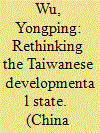

|
|
|
|
|
| Publication |
Mar 2004.
|
| Summary/Abstract |
The uniqueness of Taiwan's industrialization is that small and medium-sized enterprises (SMEs) had been the major contributors to exports. What has been responsible for the success of the SMEs? How far and in what ways did the state contribute to their success: can it be attributed to the government's industrial policy? The statist account of Taiwan's development, a dominant approach to explain its economic growth, is weak in answering these questions. This article argues that the existence of a unique industrial structure was key in the explanation of Taiwan's SME-led exports. The industrial structure was basically a consequence of the state's political strategies that determined its public policy towards the private sector. It argues that the market rather than industrial policy was the explanation of the industrial success of SMEs; the economic bureaucracy was a world of politics rather than a range of monolithic institutions; and strongman tactics rather than institutions were the source of state steering capacity and were responsible for the success of industrial policy. It concludes that Taiwan's development was a "politically inspired industrial success" rather than a state-led development.
|
|
|
|
|
|
|
|
|
|
|
|
|
|
|
|
| 10 |
ID:
053133


|
|
|
| 11 |
ID:
052285
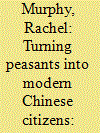

|
|
|
|
|
| Publication |
Mar 2004.
|
| Summary/Abstract |
The all-embracing discourse of population quality (suzhi) is put to work through rural primary schools in ways that help state institutions implement policies such as accelerating demographic transition, restructuring the education system, professionalizing labour markets, promoting agricultural skills training, instituting economic liberalism and carrying out patriotic education. Suzhi discourse facilitates policy implementation in four ways. First, it imbues disparate policies with seeming coherence. Secondly, by articulating a diverse set of policies through suzhi discourse, including state retreat from welfare provisioning, state institutions can be seen to be working to improve people's well-being. Thirdly, in making people responsible for raising their own quality, the need to improve suzhi is an explanation and a prescription when individuals are adversely affected by policies. Finally, suzhi discourse encourages individuals to regulate their conduct in accordance with the political drift of society. By enfolding suzhi norms into identity formation, the education system shapes each individual's ongoing process of "becoming" in ways that parallel the nation's modernization, thereby reducing the costs of policy enforcement.
|
|
|
|
|
|
|
|
|
|
|
|
|
|
|
|